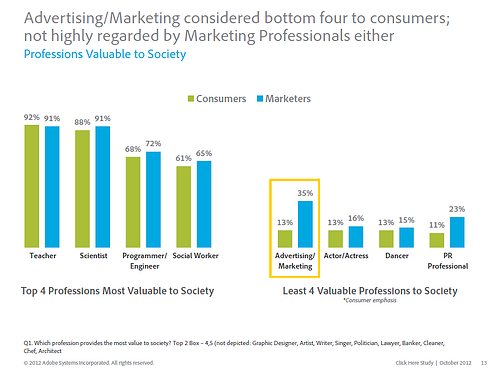The recent research study showing that marketers rank lower than politicians on the “respectability scale” might feel like a kick in the gut for most of us in this role.
From the research: only 13% of consumers agree that marketing benefits society. It’s no surprise that teachers, scientists and engineers are the top of the list, but marketing even falls below bankers (32%), lawyers (34%), and politicians (18%). One point of solace, marketers are tied with actors and dancers; so, we’re not alone.

If we deconstruct the research, we can find plenty to take issue with. What research study isn’t immune to that? For instance, the focus of the research is about online advertising, while the questions about professional respectability come after questions about the effectiveness of different marketing methods. To what extent has this approach primed respondents in a certain direction?
Additionally, when you look more deeply at the results, you find that people still “respect” the need for marketing within business. Most, in fact, consider it “strategic” and necessary for sales.

So, the research findings shouldn’t be taken too personally. As noted earlier, marketers are in the same boat as actors and dancers. It makes me think of Ode by Arthur O’Shaughnessy:
We are the music makers,
And we are the dreamers of dreams,
Wandering by lone sea-breakers
And sitting by desolate streams;—
World-losers and world-forsakers,
On whom the pale moon gleams:
Yet we are the movers and shakers
Of the world for ever, it seems.
Or, as the great Willy Wonka puts it:
Who but a marketer would ever create lickable wallpaper with snozzberry flavor???
So marketers, don’t give up on your role and profession. And remember that without you, the world would be a place with much less flavor and much less fun.
When Jeff's not busy contributing to society at large, he serves as a senior consultant and methodologist for CMB; making sense of big data, and speaking on topics like mobile and the future of market research.


 We hear a lot about Big Data—from
We hear a lot about Big Data—from  Understand and Act on Customer Needs
Understand and Act on Customer Needs Earlier this month I had the chance to present at the
Earlier this month I had the chance to present at the 
